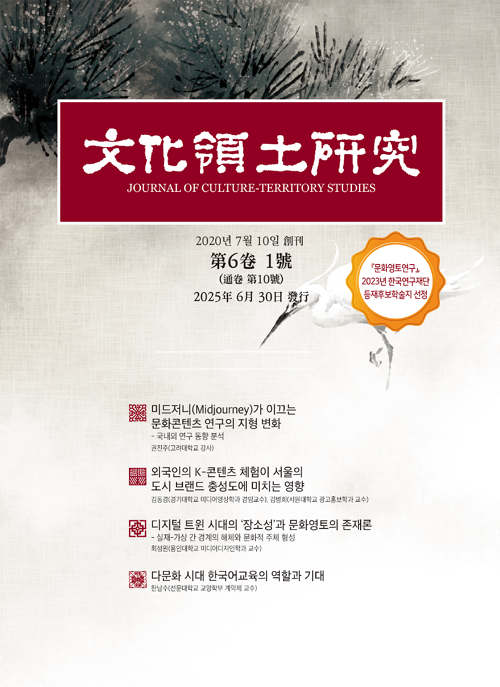- 영문명
- The Role and Expectations of Korean Language Education in the Era of Multiculturalism
- 발행기관
- 재단법인 문화영토연구원
- 저자명
- 한남수(Nam Su Han)
- 간행물 정보
- 『문화영토연구』제6권 1호, 135~169쪽, 전체 35쪽
- 주제분류
- 인문학 > 기타인문학
- 파일형태
- 발행일자
- 2025.06.30
7,000원
구매일시로부터 72시간 이내에 다운로드 가능합니다.
이 학술논문 정보는 (주)교보문고와 각 발행기관 사이에 저작물 이용 계약이 체결된 것으로, 교보문고를 통해 제공되고 있습니다.

국문 초록
다문화 시대는 1990년대 세계화의 포문과 함께 시작됐다. 1992년 한중수교 이후 외국 노동자, 국제결혼이 증가하면서 다문화사회가 본 격화됐다. 2000년대로 들어서면서 유학생 유입이 활기를 띠었고 지 리적 입지조건과 유교적 생활문화권이라는 유사성으로 인해 한국으로 유입된 외국인 중 동포를 포함해 중국인이 가장 많았다. 이들은 다른 외국인에 비해 인구수가 많을 뿐만 아니라 한국에 정착하는 비율도 높 아 한국 사회에 끼친 영향도 적지 않았기 때문이다. 그러나 이들이 한 국사회의 일원으로 적응하는 과정에서 다양한 문제에 노출돼 있고 그 들이 직면한 가장 큰 문제는 언어 장벽이다.
그들이 성원으로 사회에 참여하고 전문인력으로 성장하여 제도권 안에서 자신의 능력을 발휘하기 위해서는 한국어 소통 능력이 절실하 다. 이들이 맞춤형 한국어 교육을 받으려면 한국어 교육을 전담할 수 있는 지속적인 전문가 양성이 필요하다. 그러기 위해 한국어 학과의 역할이 어느 때보다도 중요하다. 이를 통해 이들이 직면한 문제를 해 결하는 방안으로 실용적인 한국어 학과의 발전과 방향을 탐색하고자 한다.
영문 초록
The era of multiculturalism began in the 1990s with the onset of globalization. Following the establishment of diplomatic relations between South Korea and China in 1992, the influx of foreign workers and international marriages led to the formation of a multicultural society. Entering the 2000s, the number of international students increased significantly. Due to geographic proximity and shared Confucian cultural values, a large number of Chinese nationals-including ethnic Koreans-entered South Korea, making them the most prominent foreign group not only in terms of population but also in their high settlement rate. Consequently, their influence on Korean society has been substantial. However, in the process of adapting to Korean society, these individuals have faced a variety of challenges, with the language barrier being the most critical. To become active members of society and develop into skilled professionals who can demonstrate their abilities within institutional frameworks, acquiring Korean language communication skills is essential.
To meet their needs for tailored Korean language education, there must be a continuous cultivation of professionals dedicated to teaching Korean. In this context, the role of Korean language departments is more vital than ever. This study seeks to explore practical strategies for the advancement and future direction of Korean language departments as a means of addressing the issues faced by multicultural individuals in Korea.
목차
1. 머리말
2. 다문화 시대의 현황
3. 한중 한국어학과의 변화
4. (맺음말) 한국어 교육의 역할과 과제
참고문헌
키워드
해당간행물 수록 논문
관련논문
인문학 > 기타인문학분야 BEST
더보기인문학 > 기타인문학분야 NEW
- Introduction: Venturing into Planetary Infrastructural Thinking
- International Journal of Diaspora&Cultural Criticism Vol.15 No.2 Contents
- 인류세의 기후-인프라: 인프라 인문학의 관점에서
최근 이용한 논문
교보eBook 첫 방문을 환영 합니다!

신규가입 혜택 지급이 완료 되었습니다.
바로 사용 가능한 교보e캐시 1,000원 (유효기간 7일)
지금 바로 교보eBook의 다양한 콘텐츠를 이용해 보세요!



